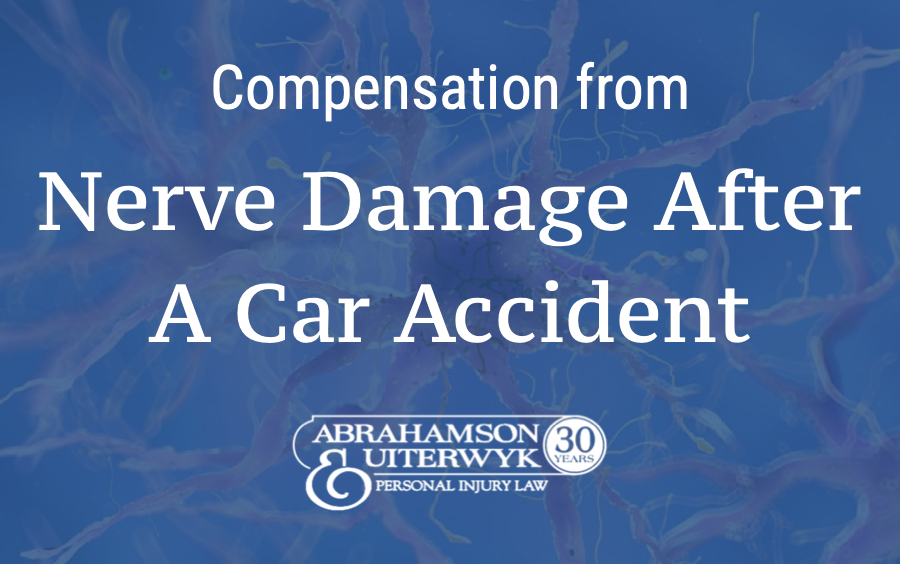Compensation to Expect From Nerve Damage After a Car Accident
Along with bringing financial and emotional stress, car accidents can leave a person severely injured. Injuries resulting from a car accident can vary greatly, including nerve damage. It is essential to understand what nerve damage is and how it can affect you. Thankfully, you have legal options.
If you or a loved one has suffered nerve damage after a car accident, do not hesitate to contact a Florida car accident attorney.

What Is the Nervous System?
The nervous system plays a vital role in your body. This system is responsible for everything your body does, from controlling muscle movements to speaking. The nervous system is primarily composed of the brain and spinal cord.
There are three main types of nerves in the body:
- Autonomic nerves: control heart rate, blood pressure, digestion, and other involuntary or partially voluntary bodily activities;
- Motor nerves: control every movement by sending signals from your brain down to your spinal cord and muscles; and
- Sensory nerves: located under skin and muscles, these nerves transmit information to your brain and spinal cord, allowing your brain to process feelings and sensations.
Because the nervous system is so important, nerve damage can severely affect a person’s quality of life.
What Is Nerve Damage?
Nerve damage, or neuropathy, is often caused by stretching and pressure of the nerves or when an injury severs nerves completely. Nerve damage can occur for various reasons aside from accidents, including infection and exposure to toxins.
Nerve damage can occur in multiple locations in the body, most commonly the back, neck, and extremities. Typical treatment for nerve damage can include medication, physical therapy, or surgery.
After a car accident, seeking medical treatment is essential to determine whether you’ve sustained nerve damage and to start treatment right away.
How a Car Accident Can Cause Nerve Damage
Because car accidents can be dangerous and result in severe injuries, nerve damage occurs often. Typical causes of nerve damage in a car accident include:
- Whiplash;
- Lacerations; and
- Blunt-force trauma.
The body can experience significant force and trauma in a car accident, resulting in nerve damage. However, this is not always immediately evident after a car accident.
A doctor may be able to diagnose nerve damage even if you don’t feel it. Checking for nerve damage is another important reason to seek medical attention immediately after a car accident.
Common Signs and Symptoms of Nerve Damage
Nerve damage after a car accident can present itself in many different, unexpected ways. What you feel will all depend on the nerves affected and what kind they are. Common signs and symptoms associated with autonomic nerve damage include:
- Inability to feel chest pain,
- Dry eyes/mouth,
- Lightheadedness,
- Bladder dysfunction, and
- Sexual dysfunction.
Signs and symptoms of motor nerve damage include:
- Weakness,
- Twitching, and
- Paralysis.
Signs and symptoms of damage to the sensory nerves include:
- Numbness,
- Tingling,
- Pain, and
- A burning sensation.
In some instances, a car accident victim may experience a mixture of symptoms, indicating damage to multiple types of nerves. It is crucial to discuss any signs and symptoms you are experiencing with your doctor to properly diagnose any nerve damage.
What Compensation Can I Expect?
If you’ve suffered nerve damage after a car accident, you may be entitled to compensation. The two kinds of damages you can seek are economic and non-economic damages.
Economic damages are straightforward and quantifiable. They include compensation for:
- Medical bills,
- Lost wages, and
- Loss of earning ability.
On the other hand, non-economic damages are a little more challenging to calculate. These include compensation for:
- Pain and suffering,
- Mental and emotional anguish, and
- Loss of enjoyment of life.
These damages are for emotional losses and typically have with little to no supporting documentation. Luckily, your car accident attorney will calculate the damages available to you, fighting aggressively to get the compensation you deserve.
Factors Affecting Compensation
Certain factors may affect the amount of compensation you receive. Some of these factors include:
- The severity of the injury;
- Whether you share fault for the accident;
- The insurance company’s willingness to settle.
Is a Lawyer Necessary?
While no law requires anyone to have legal representation after a car accident, it is to your benefit to have a car accident attorney on your side. Car accident cases involving severe injuries like nerve damage can present challenges, but an attorney will know how to handle your case. Your attorney will:
- Conduct a thorough investigation;
- Gather evidence and documentation;
- Calculate damages; and
- Engage in settlement negotiations.
Having an attorney will give you peace of mind and allow you to focus on your recovery, knowing your case is in the best hands.
Get Your Accident Questions Answered
Abrahamson & Uiterwyk has over 30 years of experience fighting for injured clients. We’ve had the pleasure of representing over 20,000 clients, working diligently to secure hundreds of millions of dollars in damages.
Our team understands the hardship and frustration car accidents can cause, and we’re here to help you find a solution.
We offer free case reviews. Contact us today, and let’s explore your legal options.
